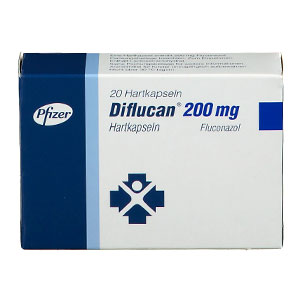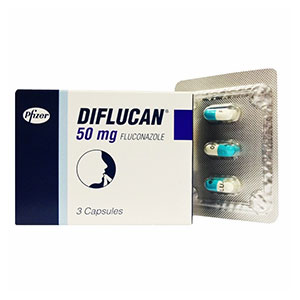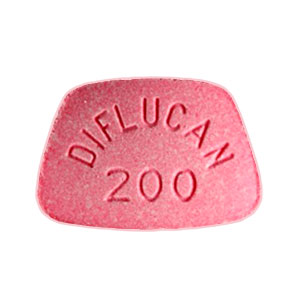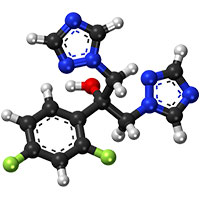The largest price comparison for medicines: the most popular pharmacies in comparison. Buy more than 200 medicines at low prices






Patent: Patent expired
Producer: Pfizer Pharma GmbH, kohlpharma GmbH
Dosage: 50mg, 100mg, 150mg, 200mg
Dosage form: capsule
Unit of measurement: mg
Active ingredient:
Application areas:
Fungal infections
Drug class: antifungal medication
Onset of action:
Duration of action:

Bioavailability: 50-100%
ATC-Code: D01AC15
Protein binding: ≥ 10%
Metabolism: Liver
Metabolites:
Half-life: 30 hours
Excretion: Kidneys
CAS number: 86386-73-4
PubChem-CID: 3365
Drug Bank: DB00196
ChemSpider: 3248
UNII: 8VZV102JFY
KEGG: D00322
ChEBI: CHEBI:46081
ChEMBL: ChEMBL106
ECHA-InfoCard: 100.156.133
Formula: C13H12F2N6O
Molar mass: 306,27 g·mol−1
Fluconazole works by inhibiting fungal 14-alpha-demethylase. This stops the synthesis of ergosterol. As a result, the fungus dies from the resulting membrane defects. The effectiveness of Diflucan has been proven against yeasts and yeast fungi, molds and dermatophytes.
Diflucan is rapidly absorbed from the digestive system. The maximum plasma concentration is already reached 0.5 to 1.5 hours after ingestion. The half-life is about 26 to 30 hours (therefore it can be used once a day). Diflucan does not form any active metabolites, but is eliminated almost unchanged by the kidneys.
Diflucan should always be taken exactly as your doctor has told you. The capsules should be swallowed unopened and whole with a glass of water by mouth. You should take the capsules at the same time every day if possible.
The dose depends on the type of infection and your response to Diflucan. It usually ranges from 50 mg to 400 mg once a day.
The dose for a child depends on body weight and is usually between 3 mg and 12 mg per kilogram of body weight.
Beware of kidney problems
Be careful if you have heart disease
Beware of the liver problems
Calcium, potassium or magnesium levels too high or too low
Caution if you develop severe reactions
Hypersensitivity to the ingredients
Concomitant use with certain drugs
Dazu zählt man Cisaprid, Terfenadin, Astemizol, Pimozid, Erythromycin und Chinidin.
Not safe
Alcohol consumption should be avoided
Do not take a double dose to make up for a forgotten dose. For the next dose, do not take more than the usual recommended amount.
If you take more than you should, tell your doctor. There could be side effects.
There is a risk of serious interactions. Therefore, regular medical monitoring is required.
Nausea
Vomit
Diarrhea
Headache
Dizziness
Food does not affect the effects of the drug.
Keep this medicine out of the sight and reach of children.
Do not store above 30°C.
What is Diflucan?


Can you take Diflucan tablets during pregnancy?


How long does it take for Diflucan to work?


Can you combine Diflucan with alcohol?


Can you buy Diflucan over the counter?


How can I buy Diflucan cheap?


Diflucan is a prescription medication used to treat the symptoms of fungal infections. These fungal infections can enter any part of the body, including the mouth, throat, esophagus, lungs, bladder, genital area, and blood. Diflucan is an option when the fungal infections cannot be treated with skin lotions and creams. It works against several types of fungi, including a yeast infection called candidiasis.
It is also used to prevent fungal infections in people with a weak immune system. Many bacteria live in our bodies and are widespread in our environment. A healthy immune system can fight them and keep them under control. However, HIV infection can weaken the immune system. The infections that occur when the immune system is impaired are called opportunistic infections. Those most affected are those with advanced HIV infection.
Diflucan belongs to a group of drugs called antifungals. The active ingredient is fluconazole.
Diflucan comes in a variety of forms. It comes in the form of 50, 100, 150, or 200 milligrams (mg) hard capsules, powder for oral suspension, and solutions for infusion. The dose and duration of administration depends on the type of infection.
The 50 and 100 mg capsules are used for the treatment and prevention of several fungal infections in adults, such as:
You can buy Diflucan 150 mg capsules in the event of an acute vaginal fungal infection and candida balanitis when local therapy is ineffective. Children:
In this category of patients, it is possible to use the drug in the form of 50 and 100 mg capsules when the children can safely swallow the capsule, usually in children over 5 years old.
Women who are experiencing symptoms of vaginal yeast infection for the first time should consult their doctor to confirm the diagnosis before starting treatment with Diflucan tablets.
Diflucan should be used with caution in patients with liver disease. In such patients, liver enzymes should be monitored during treatment, especially if they are taking the drug for a long time.
Tell your doctor if you have other health problems, including heart or kidney problems.
Diflucan should be avoided during pregnancy, especially in the first trimester.
Before buying Diflucan, tell your doctor if you have allergies to other medicines, foods, or dyes.
Please note that this medicine can rarely cause dizziness. Driving or using machines should be avoided.
Diflucan interacts with many drugs and substances. Some interactions can lead to serious consequences. For this reason, you should inform your doctor about all medications that you are currently using or have recently used.
For example, if fluconazole is taken concomitantly with hydrochlorothiazide, the plasma concentration of fluconazole may increase by 40%, which should be taken into account by the treating physician.
Co-administration with warfarin may increase prothrombin time, which may result in bleeding. Therefore, with simultaneous administration, constant monitoring of the coagulogram and prothrombin time is required.
With the simultaneous use of Diflucan with cisapride, the ventricular arrhythmia can develop like pirouettes. Therefore, this combination is contraindicated.
Diflucan interacts with benzodiazepines. For example, the simultaneous administration of midozolam and fluconazole can lead to an increase in the plasma level of midozolam and the development of psychomotor reactions. If combined use is required, it is recommended to reduce the dose of Diflucan and carefully monitor the patient's condition.
Oral contraceptives: The use of high doses of fluconazole can increase ethinyl estradiol and levonorgestrol levels.
Rifampicin reduces the plasma level of fluconazole and accelerates its elimination. When rifampicin is used concomitantly with rifampicin, it is recommended that the dose of fluconazole be increased.
Fluconazole may increase plasma concentrations of phenytoin. Therefore, dose adjustment and continuous monitoring of phenytoin plasma concentrations are required when co-administered. The same is also true for theophylline.
Sulfonylureas and their derivatives can be combined with Diflucan tablets. However, the risk of hypoglycaemia should be considered.
A prolongation of the QT interval is possible by concomitant use with terfenadine. This can cause the arrhythmias.
Caution should be exercised when astemizole is co-administered with Diflucan as plasma concentrations of astemizole may be increased.

Take Diflucan for a vaginal thrush within 2 days. I only feel a significant loss of appetite at the moment. Would like to wait a few more days to see if the effect is good.
15.05.2022


Subscribe to our newsletter and get the latest updates and special offers!
Leave a comment
Thank you for sharing your experience!
Your experiences will be published soon!